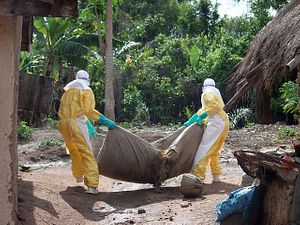Health ministers from the Association of Southeast Asian Nations (ASEAN) as well as China, Japan and South Korea announced key measures earlier this week to prevent the Ebola epidemic from reaching the region and to support affected countries, following a two-day ASEAN+3 special meeting on the issue in Bangkok.
The ministers pledged to strengthen their prevention by undertaking thirteen measures at the national, regional and global levels, according to their joint statement adopted on December 15.
Nationally, they committed to raising their level of preparedness by implementing effective health surveillance, increasing public awareness, supporting training, and ensuring appropriate assessments of their capacity.
Regionally, they vowed to step up collaboration through sharing information and expertise, boosting regional mechanisms, strengthening effective communication channels, and collaborating on the provision of financial support from available sources within the ASEAN + 3 framework.
Globally, they pledged to “fully support” Ebola affected countries through collaboration with relevant international partners in areas such as intensifying surveillance and response activities and urgently providing additional resources and assistance to countries in various forms.
At the meeting, the ASEAN + 3 health ministers also heard from other officials about the current international response to the epidemic, including the director-general of the World Health Organization (WHO) Margaret Chen and head of the United Nations Mission for Ebola Emergency Response Anthony Banbury. They were also briefed about WHO support for Ebola preparedness and response in the region from two other WHO officials.
Earlier, Thai Prime Minister Prayut Chan-o-cha also told the ministers in his opening remarks to the conference that Thailand recognized Ebola as a global threat and would help raise more assistance for nations experiencing the epidemic. He also reassured participants that the Thai government had the resources to cope with the problem, including surveillance networks, diagnosis units, and authorities who could make quick decisions if needed.
Speaking after the meeting, Thai health minister Rajata Rajatanavin reinforced Prayuth’s point that Ebola was a global problem that ASEAN and its partners needed to prepare for, particularly given the interconnected nature of the world economy.
“Preparedness is the key concept in protecting the region from Ebola, as we are closely connected by tourism, business and trade, particularly by international transportation…If an outbreak occurs in one region, there will be a high risk of the disease spreading to other areas,” Rajata said.
According to The Bangkok Post, Rajata also said that the ASEAN + 3 members would focus on working closely on four outbreak prevention strategies: cross-border outbreak prevention, building mechanisms to counter outbreaks, providing more communication channels, and cooperating over research.
He also mentioned that a hotline would be set up for the health ministers.
According to the latest figures by the WHO on December 17, there have been 18,603 reported cases of Ebola virus disease, with 6,915 reported deaths.
Although no infections have been detected thus far in Southeast Asia, some have said that in addition to increasing preparedness, ASEAN can also help tackle Ebola by not only providing resources, but also sharing knowledge from its own experience tackling the SARS pandemic in 2003.

































